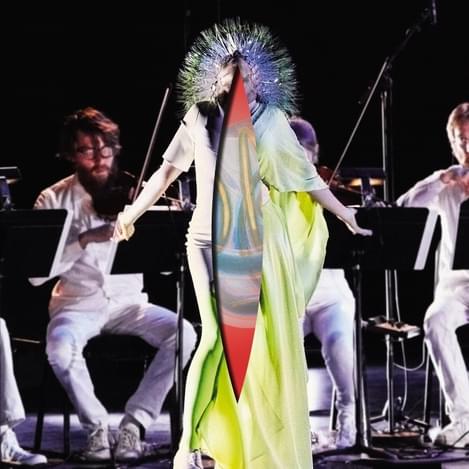Finished sympathy. Björk sings orchestral blues to devastating effect.
"Vulnicura Strings"

For me, one such place is the Rothko room at London’s Tate Modern, a space to be visited alone where you’re guaranteed a silence to sit and think in. Nevertheless, it’s an incredibly disorientating experience being there, it’s dimly lit and the art on its walls seeps into you, suggesting sadness and loss and time standing still. I wouldn’t want to go there every day, but I revisit it a few times a year, because within the room there’s a sense of solace to be found despite its pervading melancholy.
With the rebooted Vulnicura Strings, Björk has created a similar atmosphere to the room I love so much but visit so infrequently. It describes the story of a metaphorical room she was trapped in as her relationship ended and the songs’ refinements make the sense of loss even more harrowing than this year’s astonishing Vulnicura. It sounds like her heart has been ripped from her chest.
Vulnicura’s electronic elements have been removed; this reworked version includes strings and vocals only, which has brought even more richness to the arrangements. Bjork has also added an instrument to the mix I’d never heard of before, a viola organista. Fittingly for such a maverick innovator it was designed by Leonardo Da Vinci. Here Sławomir Zubrzycki, who has built the only one in existence plays it formidably and is joined by Una Sveinbjarnardóttir, who contributes additional violin parts.
Whereas Vulnicura opened with "Stonemilker" (which is beautifully pared down here), the running order for Vulnicura Strings is altered, with "History Of Touches" omitted altogether. She instead opens with “Mouth Mantra”, which plummets you straight into the horror of her break-up. The strings create such dramatic intensity they sound like Bernard Herrmann’s score for Alfred Hitchcock’s Psycho.
Similar displacement can be found in “Quicksand”, its central lyric "When I'm broken I am whole and when I'm whole I am broken", gets changed across the personal pronouns of ‘she’ and ‘we’ as the song progresses. It’s the tale of the struggle of putting oneself back together, adapting from being part of a symbiotic whole to a single celled organism and the refrain of the strings tell the story as beautifully musically as the words do. Teetering from side to side, they sound punch-drunk from the emotional ravages of heartbreak.
“Lionsong”, the only song to retain its original place from Vulnicura’s track-listing has a light melody of simple strings which follow the voice note for note and the way Björk sings ’Maybe he will come out of this, loving me’ suggests hope can be found. The words ponder on dealing with the complexity of feelings and fittingly the arrangement gets more complex as it progresses. It’s the sound of someone on their knees and when it finishes you’re on your knees with her.
But it’s not all conciliatory; “Notget” is where her anger boils to the surface, with the strings timbre accusatory and dark as the lyric. It’s also the last song to feature her voice as the record finishes with two instrumentals. Perhaps that’s her way of saying she wants to draw a line in the sand, indeed the last word of the press release is ‘onwards’.
The first of these is “Family”, where the Vulnicura lyric has been removed entirely and on which the droned strings create a disorientating sense of absence, leaving the emotions of the musical narrative to tell the story. It ends with a three minute coda that sounds like oblivion and is as immersive the holocaust section of My Bloody Valentine's “You Made Me Realise”
The first of two takes on the ten minute plus “Black Lake” sounds like a funeral procession. With her voice so unadorned and the words so naked it feels like you’re intruding on someone’s private grief. The metaphor is one of being lost in a vast ocean, with the voice and strings evoking a loneliness comparable to Debut’s “The Anchor Song”, which featured just voice and brass.
However the instrumental “Black Lake” (viola organista version) takes the funeral mood somewhere even bleaker. The viola organista draws you irrevocably into the void and removing Björk’s voice from the arrangement ironically makes her even more central to the song, because in doing so she recreates the most physically emotionally affecting part of a break up, which is the absence of the other person.
Given that as a listener one is emotionally spent by the records close one can only wonder what toll the recording process took on its creator, where Björk revisits the most personal songs of her career and rewrites them into an even more overwhelming musical framework.
Vulnicura Strings sees Björk restructuring an already phenomenal work of art and creating an even more desolate mood than the phenomenal Vulnicura, where time is frozen but also somewhere to move on from. It’s not a place to visit every day, but whenever you need a reminder about what great art looks and feels like here’s where to go to.
Get the Best Fit take on the week in music direct to your inbox every Friday

Lorde
Virgin

OSKA
Refined Believer

Tropical F*ck Storm
Fairyland Codex





